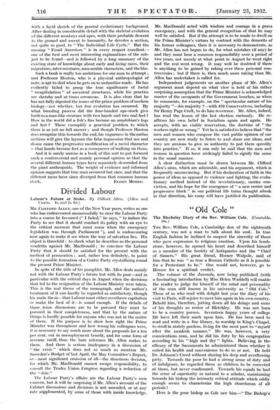Divided Labour
Labour's Future at Stake. By Clifford Allen. (Allen and Lrnwin. ls. and 2s. 6d.)
Ala. CLIFFORD ALLEN, one of the New Year peers, writes as one who has endeavoured unsuccessfully to steer the Labour Party into a course he favoured (" I failed," he says, " to induce the Party to see that it should conduct its policy with an eye to the critical moment that must come when the emergency legislation was through Parliament "), and is endeavouring now again to make it see where the way of salvation lies. His object is threefold : to check what he describes as the personal vendetta against Mr. MacDonald ; to convince the Labour Party that it should be satisfied for the present with the method of permeation ; and, rather less definitely, to point to the possible formation of a Centre Party crystallizing round the present Prime Minister.
In spite of the title of his pamphlet, Mr. Allen deals mainly not with the Labour Party's future but with its past—and in particular with the critical days in August when the decisions that led to the resignation of the Labour Ministry were taken. This is the real theme of the monograph, and the author's treatment of it can hardly be regarded as satisfactory, though his main thesis—that Labour must either overthrow capitalism or snake the best of it—is sound enough. If the details of tbose_tense discussions are to be pursued they must be pursued in their completeness, and that by the nature of things is hardly possible for anyone who was not in the centre of them. If the purpose is to show how right the Prime Minister was throughout and how wrong his colleagues were, it is necessary to say much more about the proposals for a ten per .cef►t. cut in unemployment benefit, and for some form of revenue tariff, than the bare reference Mr. Allen makes to them. And there is serious inadequacy in a discussion of the crisis " which does not so much as mention Mr. Snowden's Budget of last April, the May Committee's Report, or—most significant omission of all—the disastrous decision, for which Mr. MacDonald cannot escape responsibility, to consult the Trades Union Congress regarding a reduction of the "dole."
The Labour Party's affairs are the Labour Party's own concern, but it will be surprising if Mr. Allen's account of the Cabinet discussions and divisions is not amended, or at any rate- supplemented, by some of those with inside knowledge.
Mr. MacDonald acted with wisdom and courage in a grave emergency, and with the general, recognition of that he may
well be satisfied. But if the attempt is to be made to dwell on the Prime Minister's virtues by contrast with the demerits of his former colleagues, then it is necessary to demonstrate, as Mr. Allen has not begun to do, for what mistakes (if any) he and they must bear a common responsibility over a period of two years, not merely at what point in August he went right and the rest went wrong. It may well be doubted if there is anything to be gained by raking over these personal con- troversies ; but if there is, then much snore raking than Mr. Allen has undertaken is called for.
Independent judgements on another phase of Mr. Allen's argument must depend on what view is held of his rather surprising assumption that the Prime Minister is acknowledged master of the occupants of the Government benches, as when he comments, for example, on the " spectacular nature of his -majority "—his majority 9—with 470 Conservatives, including Sir Henry Page Croft, to do him reverence. Mr. Allen, indeed, has read the lesson of the last election curiously. He re- affirms his own belief in Socialism again and again. He accepts, with no visible reservation, the doctrine of " the workers right or wrong." Yet he is satisfied to believe that " the men and women who compose the vast public opinion of our country are now ready to listen to and share our ideas, and they are anxious to give us authority to put them speedily -into practice." If so, it can only be said that the men and women in question have strikingly failed to signify the same in the usual manner.
A clear distinction must be drawn between Mr. Clifford Allen's aims, which are admirable, and his argument, which is frequently unconvincing. But if his declaration of faith in the -power of ideas as opposed to violence and fighting, the evolu- tionary method instead of the revolutionary, carries con- viction, and his hope for the emergence of " a new centre and progressive block " in our political life turns thought afresh in that direction, his essay will have justified its publication.




































 Previous page
Previous page